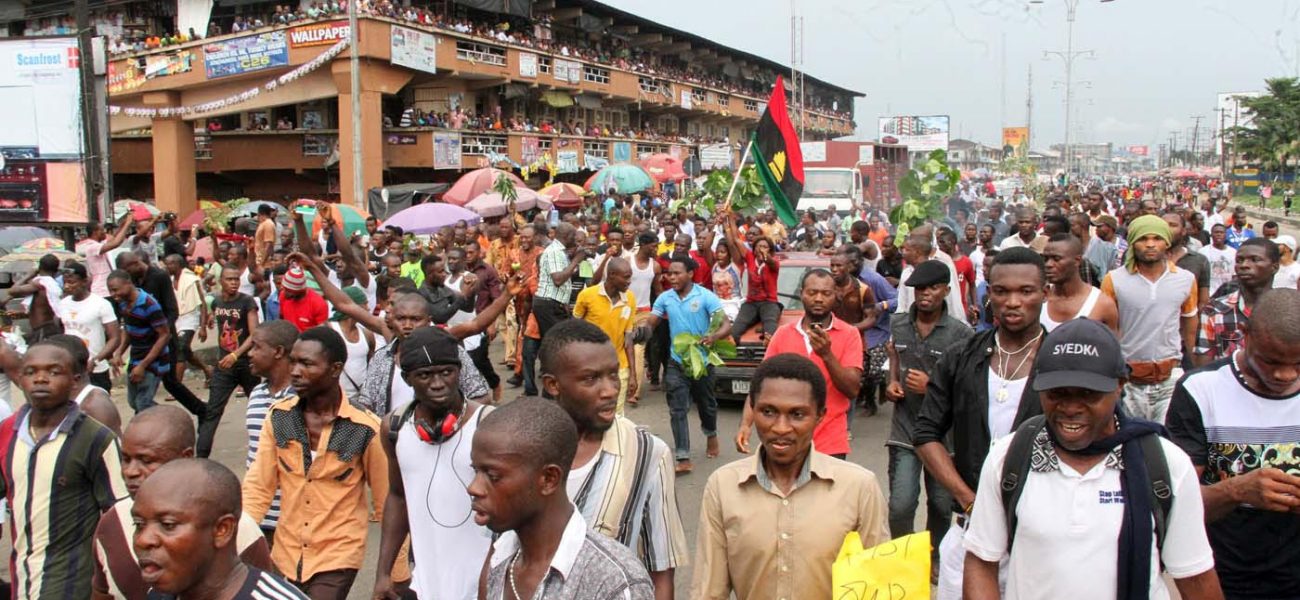The recent protests over the arrest of Mr. Nnamdi Kalu, Director of Radio Biafra and leader of the Indigenous People of Biafra (IPOB) by the Department of State Security (DSS) on October 17, 2015 has led to concerns over the agitation over the pro-secessionist group. The IPOB seek the independence of Biafra (the geographical region consisting of all South- East States and some South- South States) for historic, cultural, political, religious and economic reasons. The group also believes that the amalgamation of the Northern and Southern Protectorates by Lord Lugard in 1914 is illegal as it was contrived without the consent of all the ethnic nationalities involved.
Although this is not the first time that Nigeria has witnessed pro-secessionist groups who argue for their right to self-determination (the Anifere group and the Movement for the Actualisation for the Sovereign State of Biafra (MASSOB) for instance), it raises noteworthy observations. Firstly, although the Constitution guarantees the right to freedom of expression and the press[1], peaceful assembly and association[2] and a right to freedom of movement[3], this right has been defined to be legitimate only within the bounds of the Constitution. Therefore, the right to agitate for one’s perceived rights cannot be allowed to contravene on the rights of others and can only be allowed within the parameter of law and order.
Secondly and in relation to this, Radio Biafra has been accused of using its medium as well as social media to encourage hate crimes against other ethnic nationalities encouraging violence and disrupting social and economic activities among others in its bid for self determination. Therefore, if these allegations are correct, it is important that the Federal Government exercise its Constitutional responsibility of preserving the sovereignty of Nigeria as recognised under the 1999 Constitution.
Thirdly, the agitations call for a deeper reflection on the part of the Government to question whether certain groups within the “indivisible and indissoluble and sovereign state known as the Federal Republic of Nigeria[4]” are increasingly alienated from the Federation Unit. It will be recalled that despite a National Conference having taken place to examine and resolve the longstanding impediments to the cohesion and harmonious development of the different ethnicities within Nigeria, its Report is yet to be considered and implemented. Furthermore, although the Boko Haram group insurgents may be distinguished from the earlier cited examples of pro-secessionist groups in Nigeria since they advocate for an Islamic Nigerian State, some critics claim that their uprising is rooted in poverty and alienation from the centre; stressing the need for the Federal Government to take the matter seriously to curtail the encouragement of further terrorism within its borders for whatsoever reason.
The recent emergency meeting of South East Governors to put an end to the protests and resolve the crisis in November must be encouraged as Nigeria’s diversity must continually be viewed from the prism of its strength; united we stand, divided we fall. The most recent protest in Onitsha this December continue to be a reminder and opportunity for immediate action on the part of the Federal Government to ensure that this issue is resolved and that innocent Nigerians are spared further violence on their lives and property as a result of such protests.
[1] Section 39 of the 1999 Constitution (as amended)
[2] Section 40 of the 1999 Constitution (as amended)
[3] See section 41 of the 1999 Constitution (as amended)
[4] Section 2(1) of the 1999 Constitution (as amended)

